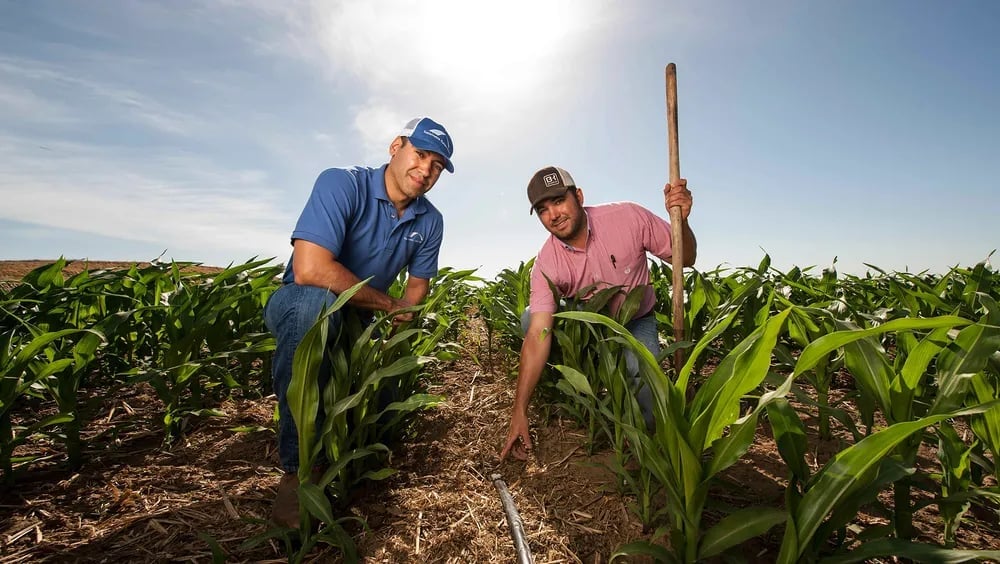November 27, 2025 | 14:19 GMT +7
November 27, 2025 | 14:19 GMT +7
Hotline: 0913.378.918
November 27, 2025 | 14:19 GMT +7
Hotline: 0913.378.918

Sustainable Conservation and farmer with installed MSDI drip tape on a silage corn field. Photo Credit: Paolo Vescia.
In 2021, we announced our water stewardship target to replenish 120% of the freshwater volume we consume, on average, across our offices and data centers by 2030. This World Water Day, we’re sharing highlights on our progress. We have supported 112 projects across 68 watersheds around the world, and estimate that these projects replenished approximately 4.5 billion gallons of water in 2024 alone. Once fully implemented, we estimate that these projects will have the capacity to replenish more than 8 billion gallons of water annually.
Agriculture accounts for nearly 70% of all water used globally, and several of our projects target the critical nexus of agriculture and water security, where solutions are imperative. Here are four partnerships launched this past year focused on water management within agricultural areas in watersheds that supply our data centers and offices:
Located in semi-arid central Chile, the Maipo River’s headwaters begin high in the Andes Mountains before passing through Santiago on the way to the Pacific Ocean. Agriculture is the primary use of water in the Maipo River basin, accounting for approximately 75% of the total demand, and farmers throughout the region have been affected by a multi-year drought. Through our partnership with Agua Segura and the Bonneville Environmental Foundation (BEF), we’re supporting the rehabilitation of a storage reservoir and lining of an irrigation canal — water infrastructure that is critical to the smallholder farmers who rely on the availability of the water for their livelihoods.
California’s dairy industry is among the largest in the country, accounting for over 21% of the nation’s milk supply. The dairy industry’s impacts on water come primarily through traditional flood irrigation with nutrient-rich manure for cow forage crops. Through our partnership, Sustainable Conservation is demonstrating the benefits of a first-of-its-kind, manure drip irrigation system that delivers blended freshwater and nutrients to crop root zones. Dairies are able to use their manure’s nutrients to grow food for their cow herds, save water, and protect local groundwater that communities rely on for drinking.
Recent water scarcity challenges have meant that many Taiwanese farmers have been unable to plant their rice crops, affecting livelihoods and food security. In partnership with N-Drip, we’re supporting a pilot project in Changhua County, Taiwan to install precision gravity-powered drip irrigation on rice fields. The irrigation upgrades will replace traditional flood irrigation, helping to reduce agricultural water demand while also lowering laboring requirements for these farmers. This pilot will help validate the water savings potential of similar projects with the aim of finding ways to scale these solutions in the future.
The semi-arid climates of southern Europe require irrigation for agricultural production and are especially susceptible to the effects of climate change. Our partnership with xFarm Technologies is supporting the application of their AI-powered irrigation module on potato farms in the Seine River basin, enabling farmers to irrigate only when, where and how much they need to by combining crop needs with environmental data collected in the field. The result is water use efficiency, quality crops and resource savings for the farmers.
These projects show how technology and collaboration can address water scarcity. By supporting innovative irrigation solutions, we're helping farmers worldwide build resilient and sustainable agricultural practices. More information about the 112 initiatives we’re supporting around the world can be found in our 2025 Water Stewardship Project Portfolio summary report.
Blg

(VAN) On the morning of November 27 in Beijing, Minister Tran Duc Thang and the Deputy Commissioner General of the General Administration of Customs of China signed a protocol on fresh jackfruit exports.

(VAN) As floodwaters recede, a vast network of irrigation works across eastern Gia Lai is emerging in a state of severe disrepair, with extensive damage demanding urgent restoration ahead of the 2025-2026 winter-spring cropping season.

(VAN) The conference reviewing three years of implementing Decision 911 identified the need to prioritize improving marine environmental quality and promoting sustainable fisheries development.

(VAN) Le Hoai Trung, Member of the Communist Party of Viet Nam Central Committee and Minister of Foreign Affairs, held talks with Vi Thao, Chairman of the Guangxi Zhuang Autonomous Region (China) this week.

(VAN) The Mekong River Commission adopts the 2026 - 2030 Strategic Plan with a people-centered approach.
/2025/11/26/1720-1-200855_132.jpg)
(VAN) Viet Nam and Japan have many conditions to expand cooperation on climate change adaptation, particularly in disaster risk management based on advanced technologies.

(VAN) The strong development of digital technology and artificial intelligence is opening up opportunities to transform science and technology into a 'Magic eye' for disaster forecasting and early warning.